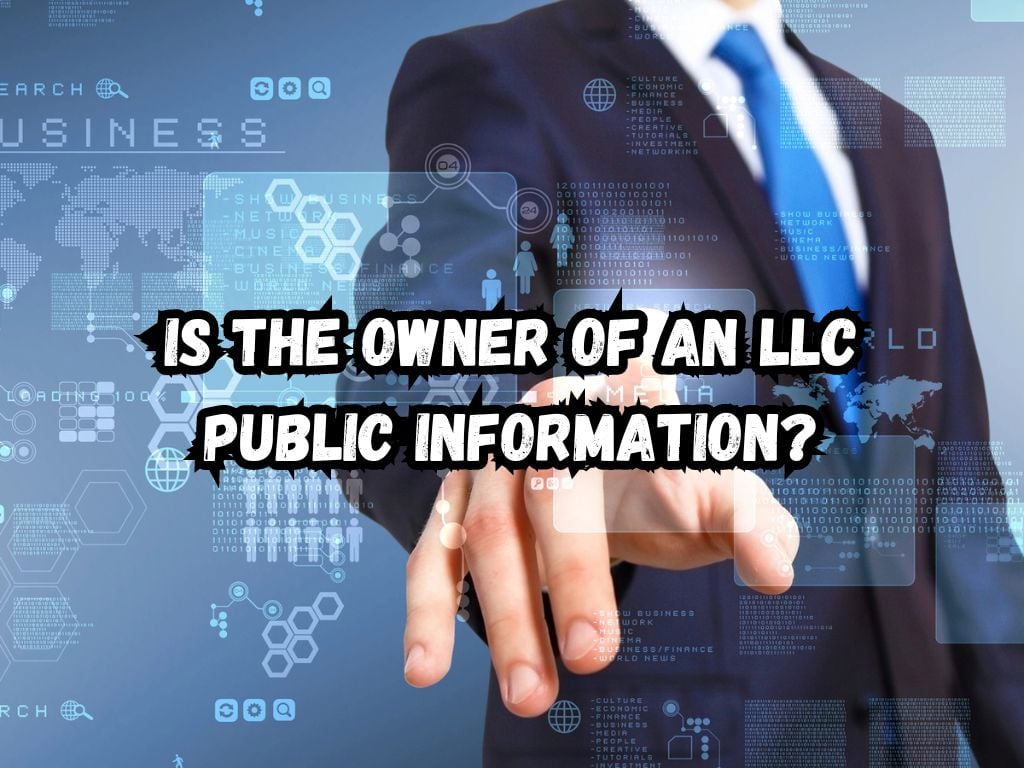Starting a Limited Liability Company (LLC) brings many questions to the forefront, one of which often revolves around the privacy of ownership details. Is the owner of an LLC public information?
As we delve into this topic, it’s important to understand that the answer can vary significantly from one state to another.
This variance stems from distinct state laws and regulations governing businesses. Our goal in this article is to provide you with a detailed exploration of LLC ownership visibility across the US, helping you navigate the complexities involved.
Is The Owner of an LLC Public Information?
In the context of LLCs, ‘public record’ signifies that certain details about the business, including ownership information, are accessible to the general public.
This transparency is mandated by state law in various jurisdictions but not universally applied across all states.
The idea behind making LLC ownership public is to foster transparency, allowing customers, partners, and others to know with whom they are doing business.
However, this openness also raises issues regarding privacy and the potential for unsolicited contact or harassment.

State-by-State Breakdown
The United States does not have a uniform federal law that dictates whether LLC owner information is public. This decision rests with individual states, leading to a diverse legal landscape.
Some states, like California, are quite transparent and require the listing of members’ or managers’ names and addresses in the Articles of Organization. Conversely, states like Wyoming and Nevada offer greater privacy, not requiring this level of disclosure.
In states with strict disclosure requirements, anyone curious about the ownership of an LLC can simply access this information through official state websites or by requesting records. This transparency aligns with those states’ policies to promote business integrity and consumer protection.
How to Find LLC Ownership Information
For those seeking LLC ownership information, the first port of call is often the Secretary of State’s website of the state where the LLC is registered.
These sites typically have a business search function that provides details about registered businesses. Information can include the names of the LLC’s organizers, members, or managers, depending on the state’s disclosure requirements.
Finding LLC ownership details involves knowing the business name and state of registration. From there, the process is generally straightforward but can vary slightly from one state to another.
In addition to state websites, other databases and tools may offer ownership information, although their accuracy and timeliness can vary.
Anonymous LLCs: States That Allow Them
Anonymous LLCs are designed to offer privacy to their owners, shielding their identities from public record. States that allow these types of LLCs have regulations in place that permit the owners to remain anonymous on public documents.
Delaware, Wyoming, and New Mexico are notable examples, offering structures that limit the amount of owner information required for public disclosure.
The creation of an anonymous LLC involves using a nominee or third-party service that appears on the formation documents, keeping the true owners’ names off public records.
This arrangement can be particularly appealing for individuals seeking to protect their privacy for personal or security reasons.
Implications of Public vs. Private Ownership
The debate between public and private ownership disclosure centers around the balance between transparency and privacy. Public disclosure supporters argue it enhances accountability, allowing stakeholders to know who controls a company.
On the other hand, privacy advocates highlight the potential risks of unwanted solicitation, identity theft, and other forms of harassment.
Privacy concerns are significant, especially in an era where information is easily accessible online. Businesses and their owners may seek to protect their details for legitimate reasons, from personal safety to competitive considerations.
Understanding the implications of your state’s laws is crucial in making informed decisions about forming an LLC.
Legal Considerations
The legal landscape surrounding the disclosure of LLC ownership information is intricate. Beyond the initial filing requirements, changes in ownership or company details must also be updated in many states.
Failure to comply with these regulations can lead to penalties, fines, or even the dissolution of the LLC.
When establishing an LLC, it’s wise to consult with a legal professional or a business advisor who understands the specific laws of your state.
They can guide you through the formation process, ensuring compliance and helping you navigate the complexities of privacy versus transparency.

Frequently Asked Questions
Is the owner of an LLC public record in California?
In California, LLC owners’ or managers’ information is part of the public record, accessible through the Articles of Organization filed with the Secretary of State.
How to find out who owns an LLC in Texas?
To uncover LLC ownership in Texas, you can use the Texas Comptroller’s website to search for the business. The site provides access to tax and public filing records, which can include ownership information.
Can you hide LLC ownership?
In certain states, it is possible to structure an LLC to maintain anonymity. This typically involves using legal services to act as the public face of your company’s documents. States like Delaware, Wyoming, and New Mexico are known for such privacy protections.
Conclusion
Understanding whether LLC ownership is a matter of public record requires navigating a complex web of state laws and regulations.
While some states prize transparency and make ownership information readily accessible, others offer avenues for maintaining privacy.
For prospective or current LLC owners, grasping these nuances is crucial in managing how much of their private information is exposed to the public.
Ultimately, the choice of where to form an LLC involves weighing the benefits of privacy against the demands for transparency, a decision that is as personal as it is legal.


 Tags:
Tags:










